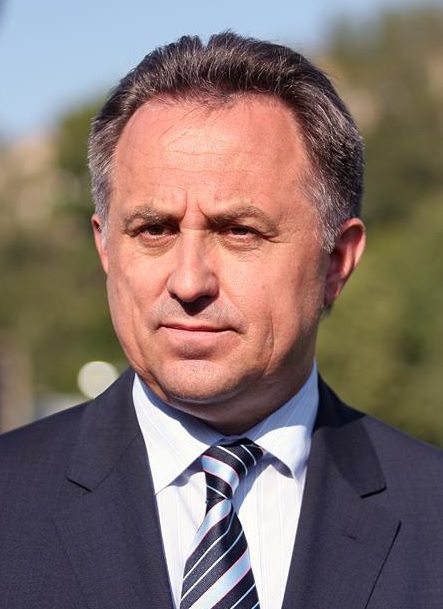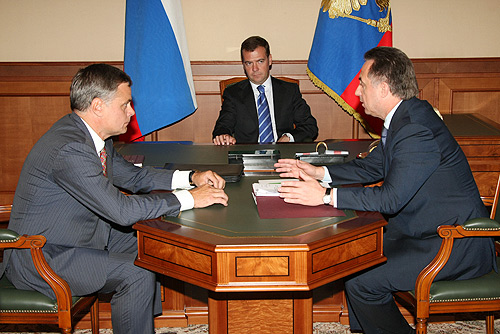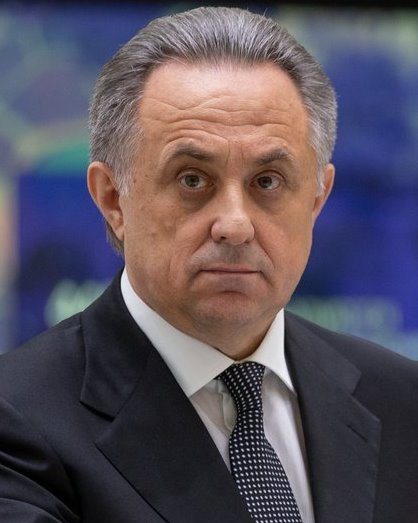1. Early life and education
Vitaly Mutko was born as Viktor Leontiyevich Mutko on December 8, 1958, in the village of Kurinskaya, within the Apsheronsky District of Krasnodar Krai, then part of the Soviet Union. He began his professional life in 1977 as a technician working on shipping vessels. His educational background includes studies at the Leningrad Water Transport Institute, from which he graduated in 1987 after attending the River Vocational College. Prior to his graduation from the college, he changed his first name from Viktor to Vitaly. Mutko further pursued his education at Saint Petersburg State University, graduating from its Faculty of Law in 1999. During his time at the Leningrad River Vocational College, he was active in the Komsomol, serving as the organization's secretary at the college. In 1980, he became a member of the Soviet Communist Party.
2. Early career and political beginning
Mutko's early career transitioned from technical work to public service. In 1983, he was selected to work for the executive committee of the Kirovsky District in Leningrad. He was subsequently elected as a member of the district council in 1990 and served as the head of the district administration until 1991.
In 1992, Mutko was appointed as the Deputy Mayor of Saint Petersburg and simultaneously served as the Chairman of the City Committee on Social Issues, holding both positions until 1996. During this period, he collaborated with Vladimir Putin, who at the time headed the city mayor's committee for external relations. Together, they played a key role in organizing the 1994 Goodwill Games in Saint Petersburg, which marked the first major international sporting event held in Russia following the dissolution of the Soviet Union.
3. Career in sports administration
Mutko developed a significant career in sports administration, influencing various levels of Russian football and broader sports policy.
He transitioned into sports administration in 1997, becoming the president of FC Zenit Saint Petersburg. During his leadership, he oversaw the club's rise to sporting prominence and its economic transformation. He also served as the vice-president of the Football Federation of St Petersburg. In 2001, he founded the Russian Premier League and served as its first president until 2003. His involvement extended to Paralympic sports when he was appointed to the committee of the Russian Paralympic Committee in 2002. He also chaired various committees and charities dedicated to assisting individuals with mental disabilities.
Mutko was elected President of the Russian Football Union (RFU) for his first term in April 2005, serving until November 2009. In 2006, he earned a doctorate in economics from Saint Petersburg State University with a thesis titled "Correlation of Market and Public Regulators in the Development of Physical Culture and Sport."

His influence grew further with his appointment as a member of the FIFA Executive Committee in 2009. He also chaired Russia's successful bid to host the 2018 FIFA World Cup, a major achievement that brought the prestigious tournament to Russia.
On September 2, 2015, Mutko was unanimously re-elected as the President of the Russian Football Union for a second term. Although Russian government officials are generally not permitted to hold top positions in sports organizations, an exception was specifically made for Mutko in July 2015. He was re-elected for a four-year term on September 24, 2016, defeating his opponent Valery Gazzaev with 266 votes to 142. On December 25, 2017, he announced a temporary relinquishment of his RFU presidency for a period of six months to appeal his Olympic ban. He ultimately resigned as head of the Russian Football Union on December 19, 2018.
In March 2017, Mutko was barred from standing for re-election as a member of the FIFA Council due to his ministerial role, which conflicted with FIFA's statutes on political neutrality and the prevention of government interference in sports organizations.
4. Political and governmental career
Mutko's political career progressed alongside his sports administration roles, culminating in significant government positions.
On October 29, 2003, he became a member of the upper house of the Russian parliament, representing the Saint Petersburg government. He held this position until 2008.

On May 12, 2008, Dmitry Medvedev, then President of Russia, appointed Mutko as the Minister of Sport, Tourism and Youth Policy. Following Vladimir Putin's return to the presidency, Mutko was reappointed as Minister of Sport on May 21, 2012, serving in Dmitry Medvedev's First Cabinet.
His governmental responsibilities expanded significantly on October 19, 2016, when he was promoted to a Deputy Prime Minister of Russia. His former deputy, Pavel Kolobkov, was appointed to succeed him as Minister of Sport. On May 18, 2018, Mutko was re-appointed as Deputy Prime Minister, but in the new cabinet, his oversight shifted from sports issues to construction and regional development.
Mutko resigned from the cabinet on January 15, 2020, as part of a government-wide resignation following President Putin's address to the Federal Assembly, which proposed several constitutional amendments. He was succeeded as Deputy Prime Minister by Marat Khusnullin on January 21. On January 29, 2020, Mutko was appointed as the chief executive officer of DOM.RF, a state-owned company involved in Russia's mortgage and realty market.
5. Controversies and major incidents
Vitaly Mutko's career has been extensively scrutinized due to several high-profile controversies and incidents, particularly concerning the integrity of sports and governance.
5.1. World Cup bid controversy
As chairman of Russia's successful bid to host the 2018 FIFA World Cup, Mutko faced criticism for comments he made about the rival English bid. He suggested that English football was corrupt. When pressed for an explanation, he clarified: "What I meant was that sometimes the English media say there is corruption in Russia, but I meant that if you dig deeply you find corruption in any country." These remarks fueled tensions during the bidding process.
5.2. Corruption allegations
Mutko accompanied the Russian team to the 2010 Winter Olympics in Vancouver, Canada. Following the games, a report by the Russian parliament's Audit Chamber severely criticized his expense claims. The report alleged that Mutko claimed for a total of 97 breakfasts during the team's twenty-day stay, costing 4.50 K USD. Additionally, each night in his hotel was charged at 1.50 K USD. In total, Mutko was accused of spending twelve times his official limit. Responding to the allegations, Mutko reportedly stated to the Vedomosti newspaper: "Why do those who want to accuse me of something not interest themselves in how much the French sports minister paid for accommodation?"
5.3. Doping scandal and bans
Mutko became a central figure in the widespread state-sponsored doping scandal that engulfed Russian sports. On November 9, 2015, an independent commission report by the World Anti-Doping Agency (WADA) accused him of overseeing a broad doping scheme within Russian track and field. Dick Pound, the head of the commission, stated that it was "impossible for him [Mutko] not to be aware of it. And if he's aware of it, he's complicit in it." The report further alleged that Mutko's agency exerted undue influence over RUSADA, the Russian anti-doping agency, which is supposed to operate independently of government or athlete influence.

In response to the evidence presented, on December 5, 2017, the International Olympic Committee (IOC) imposed a lifetime ban on Mutko from all future Olympic Games for his role in the doping conspiracy. However, Mutko appealed this decision to the Court of Arbitration for Sport (CAS) in Lausanne, Switzerland. In July 2019, the CAS overturned the IOC's lifetime ban, though the specific grounds for the overturning were not a full exoneration but often related to the scope of the IOC's jurisdiction over government officials rather than a denial of facts.
5.4. International sanctions
Vitaly Mutko has been subjected to international sanctions, particularly in connection with the Russia-Ukraine war. On February 19, 2023, he was added to the sanctions list of Ukraine. The stated reason for these sanctions is his engagement in commercial activities within economic sectors that provide a significant source of income for the Russian government, which, according to the sanctioning bodies, initiated military operations and the "genocide of civilians in Ukraine."
5.5. English speech incident
In December 2010, during a FIFA Executive Committee meeting in Zürich concerning the host country for the 2018 World Cup, Mutko delivered a welcoming speech in English. The speech, delivered with a strong Russian accent, became widely known by the phrase "Лет ми спик фром май харт" (Let me speak from my heart) and quickly gained massive popularity and became an internet meme. Mutko later claimed that he had been memorizing the speech for two weeks, even practicing it in front of his family, and that the English text had been phonetically transcribed into the Cyrillic alphabet to aid his delivery. Mutko's unique English pronunciation became a recurring subject of jokes within the Russian government itself. In 2015, then-Prime Minister Dmitry Medvedev wished Mutko a happy birthday using broken English, and President Vladimir Putin notably gifted Mutko an English self-help book.
6. Personal life
Vitaly Mutko is married to Tatiana Ivanovna Mutko. They have two daughters, Elena and Maria. He is known to have a personal relationship with President Vladimir Putin, including being a skiing partner. Following Russia's disappointing performance at the 2010 Vancouver Olympics, which saw a call for resignations from then-President Dmitry Medvedev, Mutko famously refused to step down, stating that the `慘敗は誰の責任でもないdefeat was no one's faultJapanese`. He is also known for engaging with athletes and the public on social media, often rating humorous collage images related to himself and sports figures on his Twitter account.
7. Honours and awards
Vitaly Mutko has received numerous state honors and awards in recognition of his service:
- Order of Merit for the Fatherland 3rd class (2014)
- Order of Merit for the Fatherland 4th class (2008)
- Order of Honour (1994)
- Order of Friendship (2002)
- Medal "In Commemoration of the 300th Anniversary of Saint Petersburg" (2003)
- Medal "In Commemoration of the 1000th Anniversary of Kazan" (2005)
8. Legacy and evaluation
Vitaly Mutko's legacy is complex, defined by his significant contributions to Russian sports and his controversial involvement in high-profile scandals. On one hand, he is credited with playing a crucial role in the development and professionalization of Russian football, notably leading FC Zenit Saint Petersburg to prominence and establishing the Russian Premier League. His successful chairmanship of Russia's bid to host the 2018 FIFA World Cup marked a pinnacle of his career, bringing a major global event to the country and showcasing Russia's organizational capabilities on an international stage.
However, his career is inextricably linked to serious allegations that have cast a shadow over his achievements. The state-sponsored doping scandal, as revealed by the World Anti-Doping Agency (WADA), implicated him in a systemic scheme that undermined the integrity of international sports. Although his lifetime ban by the International Olympic Committee (IOC) was later overturned by the Court of Arbitration for Sport (CAS), the allegations deeply tarnished his reputation and raised fundamental questions about ethical governance in Russian sports. Furthermore, accusations of improper expense claims and his continued presence in high office despite these controversies have fueled criticisms regarding transparency and accountability within the Russian government. More recently, international sanctions imposed in connection with the Russia-Ukraine war have further entangled his public image with geopolitical conflicts, highlighting concerns about his role in supporting the Russian state.
Ultimately, Mutko's legacy is characterized by a dichotomy: an effective administrator capable of delivering major sporting successes, yet one whose tenure was consistently marred by serious ethical and governance challenges that have drawn significant international condemnation.
9. External links
- [https://web.archive.org/web/20101103214434/http://www.russiaprofile.org/resources/whoiswho/alphabet/m/Mutko_V_L Biography]
- [https://web.archive.org/web/20150218224037/http://en.rfs.ru/ Football Union of Russia]
- [http://www.foxsports.com.au/football/simon-hill-welcomes-michael-garcias-investigation-into-2018-2022-world-cup-corruption-claims/story-e6frf423-1226871016724 FoxSports]
- [http://www.theage.com.au/sport/soccer/here-we-go-20101201-18gmg.html TheAge]
- [https://twitter.com/Vitaly_Mutko Vitaly Mutko Twitter]